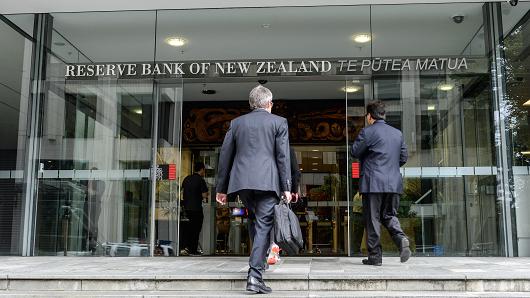PHOTO: The Reserve Bank of New Zealand. FILE
Press Release: Finder
News highlights:
- Majority of experts expect rents to increase due to higher investor costs
- 57% disagree with extending the bright-line test
- All experts predict the OCR to hold at 0.25% in April
Experts are concerned that tenants will cop higher rents under the government’s new housing policies.
In this month’s Finder RBNZ Official Cash Rate Survey, 14 experts and economists weighed in on future official cash rate (OCR) moves and other issues related to the state of New Zealand’s economy.
The government recently announced a suite of policies aimed at overhauling the Kiwi property market, which has become one of the least affordable among the 36 wealthy OECD nations.
Key moves include $3.8 billion spent on accelerating the pace of new home builds through infrastructure, extending the bright-line test from 5 to 10 years, and removing the interest deductibility “loophole” for property investors.
Although the changes are intended to help Kiwis get on the property ladder by dampening house prices, the majority of experts who weighed in (69%, 9/13) expect rents to rise in response.
This comes as Stats NZ recorded a 3% increase to rental prices in the year to February.
Kevin McHugh, Finder’s publisher in New Zealand, said that this could end up hurting those saving for their first home.
“While the government no doubt had the best of intentions when devising these policies, it’s possible that increased costs to landlords will be palmed off to renters.
“Removing tax deductions on interest costs for rental properties may be an effective way to curb investor activity, but it does come with the risk of driving up rents.
“This would put non-homeowners at an even bigger disadvantage than they were before,” McHugh said.
According to Michael Reddell of Croaking Cassanda, any house price relief will be short lived.
“The housing package does not fundamentally increase supply. However, it might push some investment properties onto the market, so it could have a short-term price effect.
“That, however, will come at the expense of increasing rents,” Reddell said.
57% of experts disagree with extending the bright-line test
One of the key changes announced as part of the new housing policies is that the bright-line test – a tax on any financial gain earned from the sale of a property – will be extended from 5 to 10 years for certain properties sold after 27 March 2021.
Over half of the experts surveyed (57%, 8) disagree with the implementation of this policy, while 36% (5) support it and 7% (1) are undecided.
Jarrod Kerr of Kiwibank, said that extending the bright-line test is a “stealth” capital gains tax.
“This extension will encourage investors to hold onto property for that much longer, but it takes a step in the right direction to level the playing field for investment,” he said.
According to Sharon Zollner of ANZ, the extension also risks reducing property supply.
“The extension of the bright-line test helps level the tax playing field, though it will likely have unfortunate unintended consequences in terms of reducing property supply responsiveness in times of strong demand,” Zollner said.
A report from realestate.co shows that as of August 2020, there were just 17,974 national property listings (a decrease of 13.2% from August 2019), while across the country, 19 regions hit 13-year record total stock lows.
All experts expect the OCR to remain on hold this month
While experts are unanimous in their view that the RBNZ will hold the OCR at 0.25% this month, over a quarter (28%, 4) forecast a rate increase by the end of 2022.
According to Kelvin Davidson of CoreLogic, New Zealand’s economy is on-track to returning to normal, so additional fiscal stimulus is unwarranted for now.
“I’m assuming that by then [2022], borders will be reopened, net migration to New Zealand will have resumed, and the RBNZ will want to be removing a little bit of the current ’emergency’ monetary stimulus,” Davidson said.
McHugh said that the RBNZ will continue its “wait and see” approach.
“The combination of escalating house prices and a national vaccine rollout should result in continued economic stability in New Zealand.
“However as we’ve all seen, anything could happen, so the RBNZ will likely wait a while before making any decisions,” McHugh said.
Here’s what our experts had to say:
Wendy Alexander, REINZ: Economic signals are stronger than many expected even 3 months ago and with the vaccination roll out there’s a chance this will continue. House prices remain on the increase, in part fuelled by low-interest loans. There is still a lot of uncertainty so whilst the next change is likely to be a rise, likely there will be a year of “wait and see” from the RBNZ before that happens.
Debbie Roberts, Property Apprentice: I don’t think the RBNZ will change the OCR at this point in time. The LVR restrictions have only recently started to have an effect on the property market (as many people had pre-approvals already in place, which have started expiring now). Also, after the Government’s shock announcement about tax changes for residential property investors, I believe it is prudent of the RBNZ to use a “wait and see” approach. The next OCR move is likely to be an upwards one, however this will to a certain extent depend on what happens with the availability of building materials, as construction plays a major role in the performance of our economy at the moment. If building materials remain in short supply, this will have a negative effect on construction, which is likely to flow through to the economy, possibly requiring a reduction of the OCR instead of an increase. Time will tell.
Alfred Guender, University of Canterbury: The economic rebound is continuing in New Zealand and abroad. The US economy is expected to grow by more than 6% this year, the Euro area by more than 4 percent, and Japan by more than 3 percent according to the IMF. Australia seems to be on the rebound too. This positive outlook will spill over into the New Zealand economy and stimulate demand. A great deal of uncertainty though remains about the strength of the continuing domestic economic recovery.
Brad Olsen, Infometrics: The economy is in a better position than expected, but still needs monetary support levels to be maintained to get the economy back to full health. We don’t see RBNZ changing the OCR until 2023, preferring to wait to see sustainably higher employment and higher (in-range) inflation appear, rather than tightening monetary policy too early and risk kneecapping the economic recovery.
Jarrod Kerr, Kiwibank: The housing market is being addressed via macro-prudential policy and government action. The two monetary policy mandates are unlikely to be met, with confidence, for some time yet.
Saten Kumar, Auckland University of Technology: In order to increase OCR, there should be sustained rises in economic growth and employment. These should be accompanied by high inflation. There is a lot of uncertainty in the markets including housing and hence it’s hard to predict the future outcomes more precisely.
Mark Holmes, University of Waikato: For the short-term, headwinds include a potentially sluggish economy, a slow roll out of the COVID-19 vaccine and continued closed New Zealand borders. Also, it is unclear how New Zealand house prices will fare given the recent announcements on government housing market policy. This all points to no change for now. Medium-term will see the effects from a significantly enhanced vaccine roll-out, some form of re-opening of NZ borders, and macroeconomic stimulus. A lift in inflation towards the target may then see upward pressure on NZ interest rates.
Donal Curtin, Economics New Zealand Ltd: RBNZ’s own forward guidance looks right at this point – inflation sustainably at target and full employment still looks a long way away
Ashley Church, ashleychurch.com: There are currently no pressures that would suggest an imminent OCR move, up or down.
Michael Gordon, Westpac: The economy is running below full capacity, and progress towards closing that gap is more a story for 2022 and beyond as the border reopens. Setting aside the supply-driven pressures on prices in the near term, a sustained lift in inflation will be some time away.
Sharon Zollner, ANZ: The RBNZ will take a very cautious approach to raising the OCR, given the fragility of the recovery. Housing policy changes increase the odds the next move could be a cut, but this is not our forecast.
Dr Oliver Hartwich, The New Zealand Initiative: The Government’s housing package, though poorly-designed policy, could slow down house price inflation in the short run. This in turn makes OCR increases in the near term less likely. That said, I believe the next move will be up but it might come later than we had thought before.
Michael Reddell, Croaking Cassandra: Inflation seems likely to continue to undershoot the target, especially as fiscal stimulus winds back and the wider world economy remains subdued.
Kelvin Davidson’CoreLogic: I’m assuming by then that borders will be reopened, net migration to NZ will have resumed, and the RBNZ will want to be removing a little bit of the current ’emergency’ monetary stimulus
Other participants: Deborah Levy, The University of Auckland Business School.
MOST POPULAR
 MYSTERY: 10 years on – who killed realtor Ashley Okland while at an Open Home? | U.S.
MYSTERY: 10 years on – who killed realtor Ashley Okland while at an Open Home? | U.S. Abandoned land for sale
Abandoned land for sale Cracking down on cartels – including real estate agents
Cracking down on cartels – including real estate agents Grand Designs New Zealand | Medieval Castle – WATCH
Grand Designs New Zealand | Medieval Castle – WATCH New Website To Hear Housing Stories
New Website To Hear Housing Stories Real Estate firm owner electoral donations – National Party failed to declare
Real Estate firm owner electoral donations – National Party failed to declare UK house prices hit record high one year from start of pandemic
UK house prices hit record high one year from start of pandemic The two factors that could halt Aussie house price boom
The two factors that could halt Aussie house price boom $50m Yarrow Stadium upgrade doesn’t stretch to new seats
$50m Yarrow Stadium upgrade doesn’t stretch to new seats Fall in prices ‘possible’ – ASB
Fall in prices ‘possible’ – ASB











